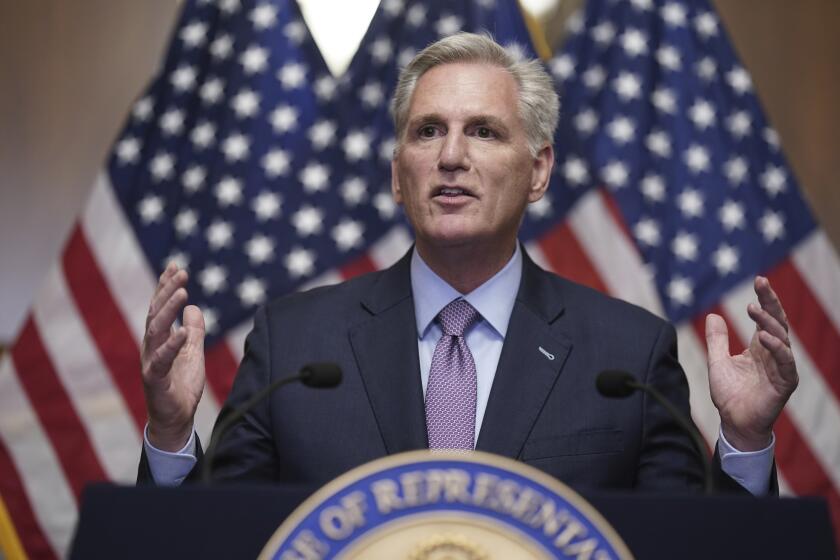Editorial: CalPERS must ditch fossil fuel investments. Its new ‘sustainable’ plan doesn’t do that

California’s two big public pension funds have been under increasing pressure to divest from fossil fuels as other big institutional investors move to shed their holdings in oil companies and other heavily polluting industries. And it’s not hard to see why.
CalPERS and CalSTRS have billions invested in fossil fuels, from multinational oil giants such as ExxonMobil and Chevron to government-owned companies in China and Saudi Arabia. In a state that prides itself on its climate leadership, there is obvious hypocrisy in using the retirement money of state employees and teachers to prop up companies that profit from the burning of oil and gas that’s causing a catastrophic overheating of our planet. It’s no wonder that so many Californians, including lawmakers, environmental activists, young people and retirees, have called for these influential funds to divest from these dangerous industries.
Last month CalPERS, which manages a portfolio of more than $462 billion, announced a new sustainable investments strategy that seems designed to address those calls, but not satisfy them. It includes a plan to more than double investment in low-carbon assets and other climate solutions to $100 billion by 2030. There’s a commitment to make “more selective investments in high emitting sectors” and to hold companies accountable for reducing their carbon footprint, by establishing a process to exit those without “credible net zero plans.”
A U.N. report shows that big nations’ fossil-fuel-boosting actions are at odds with their emissions-cutting pledges. They must do better at the COP28 climate summit.
It’s good to see the nation’s largest public pension fund taking initial steps to shift its portfolio away from some of the highest-polluting companies that refuse to switch to cleaner technologies. But the approach is far too timid, incremental and ill-defined, and doesn’t go nearly far or fast enough to respond to the scope and scale of the climate crisis. And it doesn’t change the need for a real divestment mandate.
Leaders of the pension fund said the plan would accelerate their move toward their preexisting goal of achieving a net-zero portfolio by 2050. But the 28-page plan is short on details, hazy on the criteria that will be used to determine which companies to reduce investments because of insufficient climate plans, and lacks a timeline for those decisions. CalPERS staff has promised its board to come back with those details next year.
CalPERS officials don’t see the strategy resulting in any across-the-board divestment that would exclude an entire sector of the economy. Instead, they believe in supporting even heavily polluting oil companies so long as they have committed to transitioning to lower-carbon technology.
I went to Coalinga and Huron to hear out the head of an oil industry campaign targeting Latinos. I didn’t find opposition to California’s climate policies the oil lobby is peddling.
In many ways, this plan seems like new wrapping on the fund’s old approach of using its shareholder power to try to coax fossil fuel companies into acting more responsibly. But that has not proved very successful. Just look at the oil industry’s recent actions to walk back climate pledges and launch new disinformation efforts to derail the shift to renewable energy.
CalPERS’ new strategy also seems designed to head off legislation to force the pension funds to sell their investments in the largest fossil fuel companies by 2031. The bill, Senate Bill 252, passed the state Senate, but has yet to advance in the Assembly. The pension funds’ leaders oppose the legislation on the grounds that it would reduce the diversification of their holdings and violate their fiduciary duty to make investments solely in the interest of maximizing returns.
CalPERS’ rationale for its new strategy is similarly divorced from morality. The fund’s leaders say that any decisions to reduce or shed assets will be based on the financial risks of high-polluting companies not having plans to decarbonize.
But as supporters of divestment have argued for years, casting off fossil fuel assets is at its core a financially prudent move. In a world that is rapidly shifting toward renewable energy, these investments are becoming too risky to keep.
LA’s focus on quantity over quality has bogged down various goals to increase tree planting and canopy cover. That has to change. Shade is not just a nice-to-have amenity in a rapidly warming world.
State Sen. Lena Gonzalez (D-Long Beach), who wrote SB 252, commended CalPERS for taking a step in the right direction, but said the strategy won’t stop the divestment push.
While it is encouraging to see CalPERS officials start to take seriously calls to dump fossil fuels and prioritize renewable energy, their solution would only prolong the power and influence of an industry whose reckless and deceitful actions going back decades continue to fuel a worsening climate catastrophe. It seems clear that the only way to ensure that public pension funds move out of this risky business is by forcing them to do so through legislation.
A cure for the common opinion
Get thought-provoking perspectives with our weekly newsletter.
You may occasionally receive promotional content from the Los Angeles Times.






